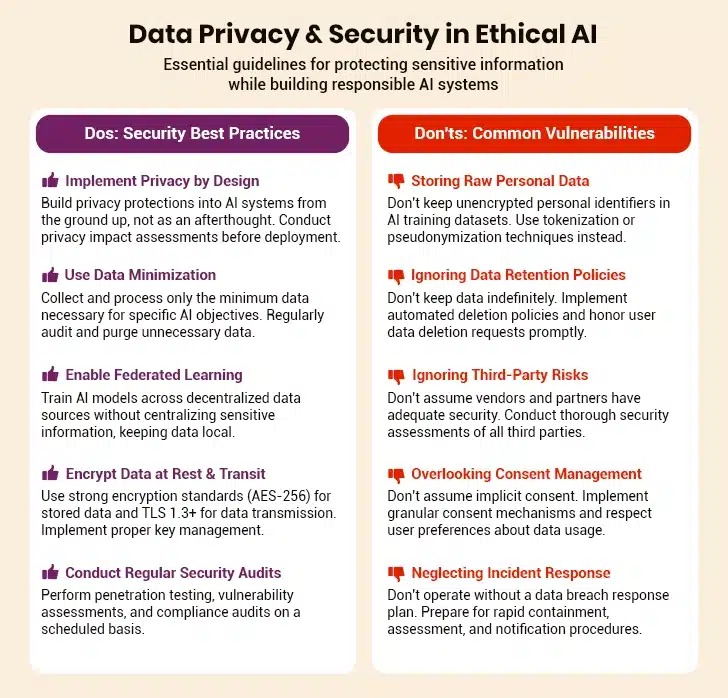Would you buy from a company that uses AI in ways you don’t trust? Most people wouldn’t, and that’s why ethical AI is not just a moral obligation but a strategic business imperative for responsible innovation. Over the years, AI has changed the way businesses operate, making things faster and smarter. But as Artificial Intelligence grows smarter, so do the risks. Mistakes in AI can lead to legal trouble, reputational damage, and even harm to society. Ethical AI isn’t just about avoiding harm; it’s about building trust with customers, employees, and society. Companies that cut corners now may face backlash later, while those who prioritize fairness and transparency will stand out. Here’s how forward-thinking businesses are making Ethical AI a core part of their AI strategy consulting and reaping the rewards.
Table of Contents
Ethical AI: Core Principles and Practices
Strategic Advantages of Ethical AI Adoption for Businesses
- Enhanced Brand Loyalty
- Regulatory Compliance and Risk Mitigation
- Responsible Innovation and Competitive Differentiation
- Long-Term Sustainability and Scalability
Implementing Ethical AI: Best Practices for Businesses
- Establish Clear Ethical Guidelines
- Ensure Fairness and Explainability
- Mitigate Bias and Promote Fairness
- Assign Accountability and Governance
- Prioritize Data Privacy and Security
- Train and Educate Employees on AI Ethics
- Monitor and Audit AI Systems Continuously
Ethical AI: Core Principles and Practices
Responsible AI starts with clear standards. These ethical principles ensure technology respects privacy, avoids bias, and explains its decisions. The practical examples show how organizations implement core principles in daily operations to keep AI safe and beneficial.
| Core Principle | Description | Example | Use Cases |
|---|---|---|---|
| Transparency & Explainability | AI systems should clearly explain how decisions are made to build trust | An AI hiring tool explains why a candidate was selected or rejected | Recruitment, loan approvals, and healthcare diagnostics where understanding decisions is critical |
| Fairness & Non-Discrimination | Ensures AI systems treat all individuals/groups fairly, avoiding discrimination and bias | Loan approval algorithms tested to prevent racial or gender bias | Credit scoring, insurance underwriting, criminal justice risk assessments |
| Accountability | Clear ownership of AI outcomes, with mechanisms to address harms | A company appoints an AI ethics officer to oversee AI system impacts | Corporate AI governance, regulatory compliance, AI audit trails |
| Privacy & Data Protection | AI systems must protect user data and adhere to privacy laws to prevent misuse or breaches | Healthcare AI systems encrypt patient data and restrict unauthorized access | Medical records management, personalized marketing, financial services |
| Safety & Robustness | AI systems must be reliable, secure, and resistant to attacks or misuse | A self-driving car detects and avoids adversarial road sign manipulations | Autonomous vehicles, industrial automation, cybersecurity |
| Human Oversight | Maintains human control over critical AI decisions (no full autonomy) | A radiologist reviews AI-generated cancer diagnoses before treatment | Medical diagnosis, military drones, judicial sentencing recommendations |
| Lawfulness & Ethical Compliance | AI systems must comply with applicable laws, regulations, and ethical standards throughout its lifecycle | AI systems adhere to GDPR for data privacy in the EU | Cross-border data processing |
Strategic Advantages of Ethical AI Adoption for Businesses
Ethical AI adoption offers clear business perks. From stronger customer relationships to reduced risks, these advantages highlight why doing AI right matters as much as doing it fast in today’s competitive market.
1. Enhanced Brand Loyalty
Customers really appreciate when businesses use AI technology in ways that respect them and protect their privacy. People notice which companies care about treating them fairly versus those that just want quick money. When your business shows it values doing the right thing, customers are more willing to engage with you. They start recommending your offerings to family members and coworkers since they trust your company. These happy customers stick around longer, which means you don’t have to spend as much money trying to find new customers. Building this kind of trust takes patience, but it pays off since loyal customers are worth much more than one-time buyers.
2. Regulatory Compliance and Risk Mitigation
Having customers who trust you also makes dealing with government rules much easier and less stressful. Laws about AI technology are changing quickly, and companies that already follow good practices don’t panic when new rules come out. You also avoid getting into expensive legal trouble or paying big fines that can hurt your business badly. Many companies get surprised by new regulations and then have to spend lots of money fixing their systems quickly. When you plan ahead and do things properly from the start, you save money and avoid headaches later. Good practices also keep you out of the news for bad reasons, which protects your reputation with customers and business partners.
3. Responsible Innovation and Competitive Differentiation
Staying ahead of legal problems gives you more time and energy to create better products than other companies in your field. Ethical AI helps you build tools that genuinely help people solve their problems. Customers can tell the difference between companies that care about them and those that only care about profits. This makes people choose your business when they have options, even if your prices are slightly higher than competitors. Employees also want to join companies that make positive contributions to society. When you attract talented employees who believe in your mission, they come up with more creative solutions for your customers.
“The challenge of ethical AI is balancing innovation with safeguards that prevent misuse and unintended consequences.” – Mira Murati – Former CTO, OpenAI.
4. Long-Term Sustainability and Scalability
Creating a positive workplace culture and customer relationships helps your business grow steadily without major problems. Ethical practices create a solid base that can handle expansion into new markets or adding more customers without breaking down. You don’t have to worry about your AI systems causing scandals or legal issues that could destroy years of hard work. Investors and lenders also prefer supporting companies that have proven they can operate responsibly over long periods of time. Your business becomes more valuable because people know it will keep growing and succeeding instead of crashing when the first big challenge comes along. This approach builds wealth that lasts for decades rather than quick success that disappears when trends change.
Essential Tools for Achieving Sustainable AI Transformation
Implementing Ethical AI: Best Practices for Businesses
Ethical AI implementation follows clear guidelines. These approaches help businesses avoid common pitfalls while creating AI solutions that respect privacy, reduce bias, and explain their decisions clearly to users.
I. Establish Clear Ethical Guidelines
Every business using artificial intelligence must have documented guidelines on ethical conduct. These guidelines serve as a manual for employees on how to use AI tools responsibly. Smart companies create these rules before they start building AI systems. When problems happen, staff can look at these rules to make good choices. Having these guidelines helps businesses stay out of trouble.
II. Ensure Fairness and Explainability
AI programs must work equally well for all types of people. Nobody gets special treatment or worse treatment because of who they are. People deserve to know why AI makes certain decisions about them. If someone gets rejected for something, they can ask questions and get real answers. Businesses must build AI systems that people can trust and understand completely.
III. Mitigate Bias and Promote Fairness
Sometimes, AI learns bad habits from old information that is unfair to certain groups of people. Smart businesses check their AI program regularly to find out these problems. They fix the AI system when it treats people differently based on things that should not matter. Regular testing helps catch these issues early. This work never stops because new problems can appear anytime.
IV. Assign Accountability and Governance
Someone in the company must be responsible when AI makes mistakes or causes harm. Businesses pick specific people to watch over their AI systems every day. These leaders make important decisions about how AI is used. They also create teams that check if the AI is working properly. Clear leadership prevents confusion when something goes wrong with technology.
V. Prioritize Data Privacy and Security
Personal information that AI uses must stay safe from bad people who want to steal it. Companies build strong mechanisms around their computer systems to keep hackers out. They only collect information they really need and delete old information they no longer use. Staff also get training about keeping data safe. Strong security protects both the business and the people who use their services.
VI. Train and Educate Employees on AI Ethics
Staff need to learn about doing the right thing when they use AI technology at their jobs. Companies should teach their staff about moral choices and responsible behavior with these tools. Regular training helps everyone understand new rules and updates. When employees are aware of the right course of action, fewer mistakes happen. Good training creates a workplace where people make smart decisions about AI every single day.
VII. Monitor and Audit AI Systems Continuously
Businesses must watch their AI programs all the time to catch problems before they get bigger. Dedicated professionals ensure that the technology is working correctly and following all the rules. They look for signs that something might go wrong or hurt people. These checks happen regularly, not just once. Constant monitoring helps companies fix issues quickly and keep their AI systems running properly.
Building an Ethical AI in Healthcare
Overcoming Challenges in Ethical AI Implementation
Building ethical AI systems comes with obstacles. From talent shortages to unclear guidelines, these problems can slow down progress. The good news? Practical solutions exist for each challenge to help companies implement AI responsibly.
1. Lack of Skilled Talent
Did you know? 6 in 10 IT professionals identified a shortage of AI skills as their top challenge to implementing AI. Businesses facing AI talent shortages can focus on growing skills internally through training programs. Existing employees often have valuable domain knowledge that, when combined with AI skills, creates powerful expertise. Partnering with universities and online learning platforms helps identify and nurture new talent early. Creating clear career paths in AI roles encourages current staff to develop relevant skills. While building internal capabilities, companies can seek help from AI strategy consulting services providers to bridge immediate gaps. This balanced approach develops talent sustainably while meeting current needs.
2. High Implementation Costs
Businesses can manage AI costs by taking a step-by-step approach rather than rushing into expensive setups. Starting small with focused pilot projects can help test effectiveness before bigger investments. Cloud-based AI services offer flexible payment models that meet your needs. Using open-source tools also cuts down on software licensing fees while still delivering results. Furthermore, training existing staff reduces the need for costly external hires. This gradual method spreads out expenses while proving value at each stage, making adoption sustainable.
3. Inclusivity and Accessibility
Building AI that works for everyone begins with inclusive design principles from day one. Interfaces should accommodate different abilities through features like voice commands and adjustable displays. Testing with diverse user groups helps catch potential barriers early in development. Always remember that simple, clear designs make technology approachable for all skill levels. Furthermore, regular bias checks ensure fair treatment across different user demographics. Continuous feedback channels let real users shape improvements, creating systems that truly serve everyone without exception.
4. Lack of Standardized Regulations
Businesses often feel confused about AI rules because different countries have different laws, and some of them have no clear guidelines at all. Companies can solve this problem by creating their own internal standards that follow the strictest rules from any country where they operate. Working together with industry groups helps businesses develop common practices that everyone can follow. Staying updated with government announcements and legal changes prevents surprises later. Furthermore, hiring legal experts who specialize in technology law provides valuable guidance for complex decisions. Companies should also document everything they do with AI so they can prove they acted responsibly if questions arise. Lastly, participating in discussions with lawmakers helps shape future regulations in positive ways. Building flexible systems makes it easier to adapt when new rules appear.
5. Job Displacement & Economic Impact
A thoughtful approach to AI adoption focuses on enhancing jobs rather than eliminating them. Upskilling programs help workers transition into new roles that work alongside AI systems. Many organizations find AI actually creates different types of jobs requiring human judgment. Phased implementation gives employees time to adapt to changing workplace needs. Furthermore, supporting policies like transition programs help communities adjust to economic shifts. This balanced strategy captures AI’s benefits while maintaining workforce stability and opportunity.
Drive Business Impact with Damco’s Expertise
Ethical AI is the backbone of responsible innovation. From fairness to transparency, businesses that embrace these principles gain trust, avoid pitfalls, and create long-term value. Cutting corners today can lead to bigger problems tomorrow.
The message is loud and clear: Adopting ethical AI isn’t optional; it’s essential for growth and sustainability. Those who wait will be left behind.
Looking ahead, AI can transform society for the better but only if we guide it the right way. By acting now, businesses can shape a future where AI benefits everyone. Ready to embrace ethical AI strategy consulting services? Damco provides the tools and strategic guidance to make it happen. Let’s innovate responsibly.








